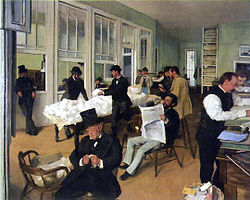Top Qs
Timeline
Chat
Perspective
Cotton factor
Fiduciary broker used by cotton planters From Wikipedia, the free encyclopedia
Remove ads
In the antebellum and Reconstruction era South, most cotton planters relied on cotton factors (also known as cotton brokers) to sell their crops for them.
Remove ads
Description
Summarize
Perspective
The cotton factor was usually located in an urban center of commerce, such as Charleston, Mobile, New Orleans, or Savannah (harbor cities; there was not yet a network of railroads), where they could most efficiently tend to business matters for their rural clients. Prior to the American Civil War, the states of Alabama, Georgia, Louisiana, and Mississippi were producing more than half of the world's cotton, but Arkansas, Tennessee, and Texas produced large amounts also.[1] At the same time, the port of New Orleans exported the most cotton, followed by the port of Mobile.[2] Cotton factors also frequently purchased goods for their clients, and even handled shipment of those goods to the clients, among other services.
As one source notes,
The factor was a versatile man of business in an agrarian society who performed many different services for the planter in addition to selling his crops. He purchased or sold slaves for his client, arranged for the hiring of slaves or the placing of the planter's children in distant schools, gave advice concerning the condition of the market or the advisability of selling or withholding his crop, and bought for his client a large proportion of the plantation supplies.[3]
Not all factors in the antebellum and Reconstruction era South were cotton factors; some were factors of other commodities. In 1858, for example, New Orleans boasted 63 sugar and molasses factors. Louisiana produced large amounts of sugar cane, but it probably had an even greater number of cotton factors.[4]
Remove ads
References
Wikiwand - on
Seamless Wikipedia browsing. On steroids.
Remove ads

